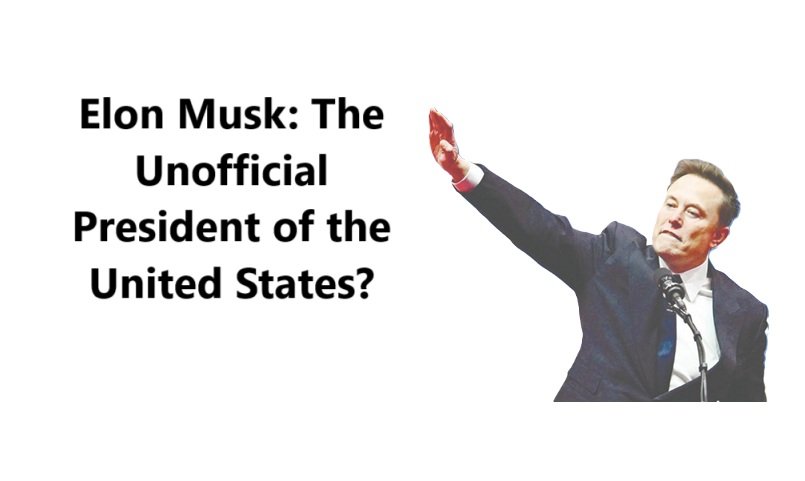
Elon Musk: The Unofficial President of the United States?
The return of Donald Trump to the U.S. presidency in 2025 brought with it a surprising development—the establishment of the Department of Government Efficiency (DOGE), led by none other than Elon Musk. As the CEO of Tesla, SpaceX, and several other transformative ventures, Musk has been a defining figure in technological innovation. However, his appointment to oversee DOGE has sparked a new geopolitical controversy, with many analysts and thinkers worldwide questioning the extent of his influence on U.S. governance.
The central argument revolves around whether Elon Musk has become the de facto or “unofficial president” of the United States. From shaping policy decisions to potentially redefining the boundaries between corporate power and democratic governance, Musk’s unprecedented role demands closer scrutiny.
The Genesis of the Controversy: Musk and DOGE Department
President Trump’s creation of the DOGE Department aimed to streamline government operations, eliminate bureaucratic inefficiencies, and reduce federal spending. However, the appointment of Elon Musk—a private entrepreneur with no previous experience in government—was unexpected. Critics argue that this move signals a shift toward corporate governance within the public sector.
DOGE’s responsibilities include modernizing government technology, optimizing defense budgets, and advising on large-scale infrastructure projects. Musk’s influence, therefore, extends far beyond economic reforms; it touches defense, energy policy, and even space diplomacy. This wide-reaching power has fueled speculation that Musk is operating as an “unofficial president,” guiding crucial aspects of U.S. governance.
Reasons Behind the Theory: Musk’s Growing Influence
1. Direct Influence on National Policy
Musk’s leadership of DOGE grants him direct input into federal budget allocations and technological modernization strategies. Analysts note that Musk’s influence is visible in:
- Defense Priorities: Reports suggest Musk’s involvement in decisions regarding space-based defense systems, leveraging SpaceX’s Starlink technology for military communications.
- Cryptocurrency Integration: The DOGE department’s acronym and Musk’s known enthusiasm for Dogecoin have reignited debates over the integration of cryptocurrency in federal economic frameworks. His influence on U.S. monetary policy—traditionally the Federal Reserve’s domain—further amplifies concerns.
2. Control Over Critical National Infrastructure
Elon Musk’s companies already control or influence several critical infrastructure sectors:
- SpaceX: The backbone of NASA’s space ambitions and U.S. military satellite launches.
- Tesla: Leading the renewable energy revolution, potentially influencing national energy policies.
- Starlink: Providing global internet coverage with significant implications for national security.
Geopolitical analysts argue that no private citizen should wield such influence over essential infrastructure without public accountability. The concern is that Musk’s corporate ambitions could become inseparable from national interests, blurring democratic lines.
3. Influence in Global Diplomacy
Musk’s role in global diplomacy has become increasingly visible:
- Ukraine-Russia Conflict: Starlink’s provision of internet services in Ukraine during the Russia-Ukraine war positioned Musk as a player in global geopolitics.
- China Relations: Musk’s extensive business ties with China through Tesla’s Shanghai Gigafactory raise questions about his influence on U.S.-China relations.
Such involvements, typically managed by state officials, are now influenced by Musk’s corporate strategies. This has led to concerns about potential conflicts of interest and accountability.
Arguments from Global Geopolitical Thinkers
A New Age of Technocracy?
Dr. Henry Kissinger, former U.S. Secretary of State, discussed the influence of private tech companies on national defense and foreign policy in a paper titled “How Private Tech Companies Are Reshaping Great Power Competition,” published by the Johns Hopkins School of Advanced and International Studies in August 2023. sais.jhu.edu
Corporate Power vs. Democratic Institutions
Anne-Marie Slaughter, CEO of New America, has expressed concerns about the role of private tech companies in governance. While the specific quote you mentioned isn’t directly attributed to her in the provided sources, her views on the intersection of technology and governance are discussed in various articles, including her piece “In the Digital Age, Foreign Policy Won’t Be Decided by Presidents,” published in Wired in 2018. wired.com
Strategic Balancer or Democratic Threat?
C. Raja Mohan, an Indian geopolitical expert, has written extensively on technology’s impact on governance. While the exact quote isn’t found in the provided sources, his perspectives are featured in articles such as “C. Raja Mohan on US-India Ties,” a video discussion available on YouTube. youtube.com
For more detailed insights, you may refer to the respective articles and discussions linked above.
Public Reactions and Media Narratives
The narrative of Musk as the “unofficial president” has gained traction on social media platforms, with hashtags like #MuskPresident trending globally. Conspiracy theories abound, with some suggesting that Musk’s control over Starlink could give him surveillance capabilities surpassing government agencies. Others believe that Musk’s growing influence is part of a broader plan to integrate corporate governance into democratic structures, making him the most powerful unelected figure in modern U.S. history.
Counterarguments: Musk’s Influence Within Limits?
Not all observers agree with the “unofficial president” theory. Some point out that:
- DOGE is still accountable to Congress and operates within constitutional frameworks.
- Musk’s influence, while significant, is advisory in nature and subject to presidential approval.
- The U.S. system of checks and balances prevents any one individual from wielding unchecked power.
However, critics argue that the informal nature of Musk’s influence, especially through public platforms like Twitter, makes it difficult to measure and regulate.
Conclusion: A New Era in U.S. Governance?
The idea of Elon Musk as the “unofficial president” reflects growing concerns about the intersection of corporate power and democratic governance. While Musk’s technological expertise and ambitious vision can drive efficiency and innovation, the lack of public accountability for such an influential role raises fundamental questions about the nature of democracy in the 21st century.
As the geopolitical landscape evolves, the U.S. must confront these questions. Can democratic institutions adapt to the rise of technocratic influence? How should corporate leaders participating in governance be held accountable? The answers will define not only America’s future but also the broader democratic world order.
In the coming years, Elon Musk’s role within the U.S. governance framework will remain under intense scrutiny. Whether he continues to be perceived as an “unofficial president” or merely a highly influential advisor will depend on how transparent, accountable, and democratic his influence proves to be.
Read This: U.S. $400 Million Aid to Pakistan for F-16 Fighter Jets: Bad for India’s Security






